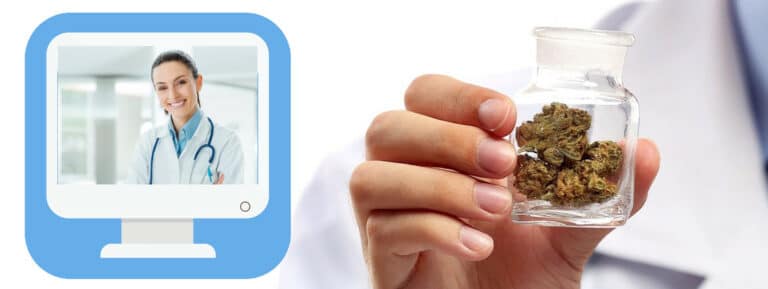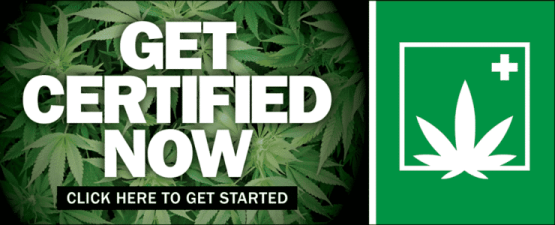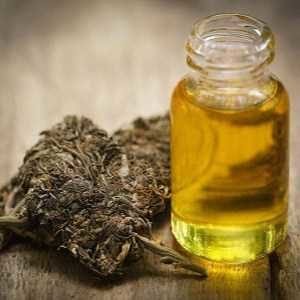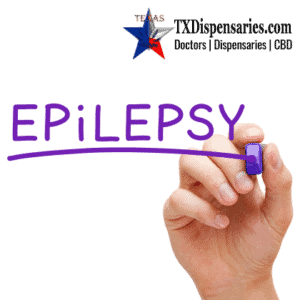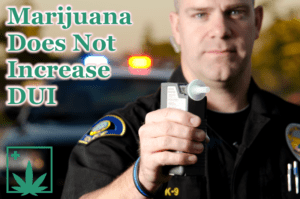Hot To Get Medical Cannabis in Texas: 3 Easy Steps
Patients suffering from a list of qualifying medical conditions may be eligible to shop at Texas dispensaries, however, they do not actually get a medical marijuana card as they would in most states.
Instead, a certified Texas medical marijuana doctor can prescribe Lower-THC High CBD cannabis to patients suffering from qualifying medical conditions.
Step 1: Make sure you qualify
Texans suffering from a list of qualifying medical conditions may be eligible for a medical marijuana prescription, or cannabis certificate. Patients do not receive an actual Texas medical marijuana card as in most states.
Step 2: Make an appointment with a state licensed medical marijuana doctor
Contact a doctor certified to prescribe medical cannabis in Texas from the states list or mind one on the map. Online is the easiest way.
To find a Texas medical marijuana doctor, patients can complete the patient registration form below. Get started online right away or schedule a consultation to see if you qualify.
Step 3: Get your medical cannabis certificate from the state.
Tell the doctor or their staff about the qualifying medical condition. If needed the doctors staff can help patients gather all of the necessary medical records required online, fax or in person for the initial examination. Do an online face to face consultation with the doctor.
If approved for medical cannabis, the doctor will enter the patents information into the Compassionate Use Registry. The patient will then be able to purchase Lower THC High CBD marijuana products.

Sign Up for Medical Cannabis in Texas
For medical marijuana patients that qualify for the current Lower THC High CBD program, we make it easy to connect with a state certified doctor online. You will also receive updates & news relative to the TX medical marijuana industry.
If you are interested, simply fill out the MMJ patient registration form to get started. Legal Residents Only.

MMJ Patient Registration Form

Online telemedicine & telehealth appointments Are available to medical marijuana patients in Texas
Yes. The state of Texas permits qualified patients to confer with their doctor using medcard telemedicine from the comfort of their home for both initial examinations and follow-up appointments.
“Telemedicine” is the practice of consulting with a doctor via telephone, tablet, PC, or other means of a teleconference. The term “telehealth,” on the other hand, is reserved for consultations with healthcare providers who are not licensed physicians or their agents.
However, the state differentiates between the terms “telemedicine” and “telehealth.”
Senate Bill 1107 (85th Texas Legislature, 2017) amended the definition of telemedicine to mean:
“…a health care service delivered by a physician licensed in this state, or a health professional acting under the delegation and supervision of a physician licensed in this state, and acting within the scope of the physician’s or health professional’s license to a patient at a different physical location than the physician or health professional using telecommunications or information technology.”
(Prior to the amendment, telemedicine laws explicitly excluded the use of a telephone, and telemedicine appointments were not allowed for initial examinations.)
Furthermore, medical records including documents such as scans, X-rays, lab results, etc., can be transmitted via the internet.
Not all medical marijuana doctors in Texas offer telemedicine to patients seeking a cannabis prescription. Patients need to contact a medical marijuana doctor with whom they would like to consult to determine if they offer telemedicine appointments in their practice.
Texas Cannabis Cert FAQ
Am I required to make follow-up appointments with my doctor?
Yes. Frequent follow-up appointments are required for medical marijuana patients. According to Compassionate Telemedicine follow-up appointments are required every two to four months.
What are the requirements for getting access to medical marijuana in Texas?
In order to qualify for access to medical marijuana in Texas, a patient must be a permanent resident. Furthermore, the patient must be diagnosed with a qualifying medical condition (list below) and seen by a certified Texas medical marijuana doctor.
Patients under the age of 18 may also be eligible for a medical cannabis certificate. However, in the case of minors, a second qualified physician must concur with the prescribed treatment. A parent or guardian of a minor must act as a caregiver to purchase and administer the medicine and he or she will be required to show proof of identification.
What does a doctor visit cost?
Fees for initial appointments range from $180 to $270 depending on the healthcare provider and their specialty. Follow-up appointments range from $130 to $180.
What are the qualifying conditions for Texas medical marijuana?
Are medical marijuana patients required to register with the state?
Patients do not need to register with the state. However, patient information must be entered into the Texas Compassionate Use Registry by a qualified medical marijuana doctor. The information is also shared with Texas dispensaries and may be shared with law enforcement agencies.
Is there a fee to be listed in the Texas Compassionate Use Registry?
Aside from physicians’ fees and the cost of meds, there are no fees to be included in the Texas Compassionate Use Registry.
Am I permitted to grow marijuana at home?
No. Texas medical marijuana patients are not allowed to grow marijuana at home. Only licensed medical marijuana dispensaries are permitted to grow marijuana.
Where do I find medical marijuana dispensaries in Texas?
Cannabis-infused medicines may only be purchased at licensed Texas dispensaries.
Three companies were licensed under the TX medical marijuana program: GoodBlend, Compassionate Cultivation, and Fluent.
TX Marijuana FAQ
 Yes. The active Texas dispensaries offer home delivery throughout the state. Marijuana deliveries RX is the preferred method, as there are a limited number of open brick and mortar locations to shop at.
Yes. The active Texas dispensaries offer home delivery throughout the state. Marijuana deliveries RX is the preferred method, as there are a limited number of open brick and mortar locations to shop at.
The patient’s purchase limit is determined by the attending physician. Texas dispensaries may only dispense the exact amount specified in the prescription.
Texas Occupations Code Sec. 169.001 defines “Low-THC Cannabis” as:
“The plant Cannabis sativa L., and any part of that plant or any compound, manufacture, salt, derivative, mixture, preparation, resin, or oil of that plant that contains not more than 1.0 percent by weight of tetrahydrocannabinols.”. 1mg THC to 10 MG CBD
Under Texas Health and Safety Code §481.111(e)(1) patients and legal guardians that have been approved for medical marijuana use are exempt from state laws prohibiting possession of marijuana.
Cannabis oils, tinctures, capsules, topicals, and inhalers are available at Texas dispensaries. Moreover, only products containing less than one percent THC and a minimum of 10 percent CBD may be sold. Only limited forms of cannabis-infused edibles are available. However, oils and tinctures can be added to food and beverages for consumption.
Marijuana and cannabis concentrates (hash, wax, rosin, etc.) for smoking, vaping, dabbing, and cooking are still illegal in Texas. Patients seeking the fast onset time and high bioavailability of inhalation methods should ask their doctor about cannabis inhalers.
Can I transport medical marijuana in Texas?
When driving with medical marijuana in a car, it must be stowed in a child-proof container, out of arm’s reach by the driver.
Can I consume Medical cannabis & CBD in public?
Public consumption is prohibited and no private facilities permit the consumption of in the state of Texas.
Depending on the type of products, some are perfectly fine. Texas is not selling smokable flower, so the product line is pretty discrete. It’s not an issue if it’s in your purse and you take a gummy, or a cannabis inhaler.
Are TX marijuana patients allowed to operate a vehicle?
Because cannabis products in Texas are non-intoxicating, patients are permitted to drive while using medical marijuana. However, new patients should abstain from driving immediately after consuming medical marijuana products until they are familiar with the effects. Also, be advised that larger doses of CBD can cause drowsiness.
Are Regulated cannabis products lab tested?
Licensees must comply with all applicable provisions of the Texas Agriculture Code and the Texas Department of Agriculture’s administrative rules, Title 4, Part 1.
All medical marijuana products produced in Texas must be tested for levels of THC and CBD, as well as for “residual solvents, pesticides, fungicides, fertilizers, mold, and heavy metals, in accordance with applicable provisions of the Texas Agriculture Code and Texas Department of Agriculture’s administrative rules, Title 4, Part 1, and Code of Federal Regulations, Title 16, Part 1107.”
Also, only pesticides with minimal risk as outlined in the Federal Insecticide, Fungicide, and Rodenticide Act, 7 USC §136 may be used on cannabis.
Texas Health and Safety Code Ch.487 regulates the cultivation, processing, and dispensing of low-THC cannabis. The state does not license cannabis testing facilities. Under the law, licensed dispensing organizations are required to test their own low-THC products.
Are background checks required for employees at Texas dispensaries?
Yes. Dispensaries must submit form RSD-303 for each employee. Once registered, the employee is required to create an account in CURT.
Texas Health & Safety Code §487.151 lists requirements for employees to obtain a registration to work at any Texas dispensary. Additional information can be found in the Administrative Rules, Section 12.12.
What are the packaging and label requirements for Texas medical marijuana products?
All packaging must be child-resistant. All final packaging labels must include the dosage prescribed, the potency of the product (THC and CBD), and the means of administration. Packages must also include the physician’s name, the patient’s name, and the dispensary’s name, state license number, telephone number, and mailing address.
All packages are also required to contain a batch number, sequential serial number, and bar code used to identify the batch associated with manufacturing and processing.
How are patients included in the Texas Compassionate Use Registry?
The patient’s physician will enter the patient information including the details of their treatment plan in the Compassionate Use Registry. Texas dispensaries have access to the registry to confirm the patient’s information.
Can I take medical marijuana to another state?
No. Patients are not permitted to transport cannabis meds across state lines whether by land or air travel.
However, Texas medical marijuana patients may be able to shop at dispensaries in a handful of states with medical marijuana reciprocity programs.
Moreover, 18 U.S. states now permit all adults 21 years of age and older to shop at recreational marijuana dispensaries.
Can patients shop at Texas dispensaries with an out-of-state medical marijuana card?
No. Texas does not offer reciprocity with other U.S. states at this time.
What is the CURT system?
CURT — the Compassionate Use Registry of Texas — is an online system provided by DPS and used by Qualified physicians to input and manage low-THC prescriptions. Physicians who wish to prescribe low-THC cannabis to qualifying patients must register in CURT.
Qualified physicians registered as prescribers of low-THC cannabis access the Compassionate-Use Registry using the department’s secure web portal. The CURT system is available to physicians and dispensing organizations 24-hours a day.
Also, Texas dispensaries must access the CURT system to search for the patient’s information before filling any related prescriptions.
What are the qualifications for physicians to approve patients?
Early in the program, fewer than 20 doctors across the state were officially registered with the Texas Department of Public Safety to prescribe medical marijuana. At the start of 2021, there were 3,500.
Physician qualifications are outlined in the Texas Compassionate Use Act §169.002 as follows. They must have proof certifications in a medical specialty relevant to the treatment of each patient’s particular medical condition by the American Board of Medical Specialties or the Bureau of Osteopathic Specialists.
Only a physician who is certified may approve a patient for access to low-THC cannabis.
Before a qualified physician approves a patient for Low THC medical marijuana products, the physician must register as the prescriber for that patient in the Compassionate Use Registry maintained by the state of Texas.
Will being entered into the Compassionate Use Program (CUP) affect a patient’s eligibility for a Texas License to Carry a Handgun?
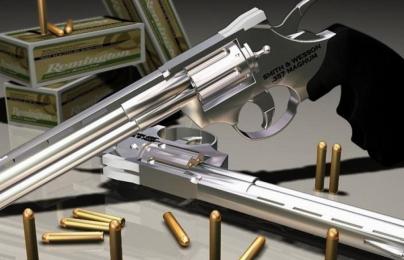
Can patients with a Texas medical marijuana card buy or own guns?
According to the Texas Department of Public Safety website:
“A patient’s participation in CUP does not, in itself, disqualify the individual from obtaining or maintaining a License to Carry (LTC). Notwithstanding that certain medical marijuana programs have been determined by the FBI to disqualify an individual from possessing firearms, the department does not believe this determination applies to Texas’ low-THC cannabis, Compassionate Use Program.
However, certain medical conditions under certain circumstances may be disqualifying if the medical condition potentially affects the individual’s ability to exercise sound judgment.

Medical Marijuana Links:
Additional TX MMJ resources and links
- Medical marijuana in Texas
- Qualifying medical conditions
- Medical marijuana prescriptions
- Tutorial: How to become a Texas medical marijuana Patient
- Texas Compassionate Use Registry
- Forms
- Telemed Process slide presentation
- Contact
- Submit a Complaint
- Senate Bill 339 Medical use of low-THC (PDF)
- House Bill 3703 Expanded medical use of low-THC (PDF)
- Texas marijuana laws
- CURT Accessibility Updates
- FAQs
- Program Development Updates
- CURT Accessibility Updates
- Law Enforcement FAQ’s
- Sample Prescription Packaging (PDF)
- Law Enforcement
- News & Updates
- Physician Application Instructions (PDF)
- Physician Registration
- Dispensing Organization Licensing
- Employee Registration
- Fingerprinting Instructions
- Texas NORML
- Customer Support: 512.424.7293


